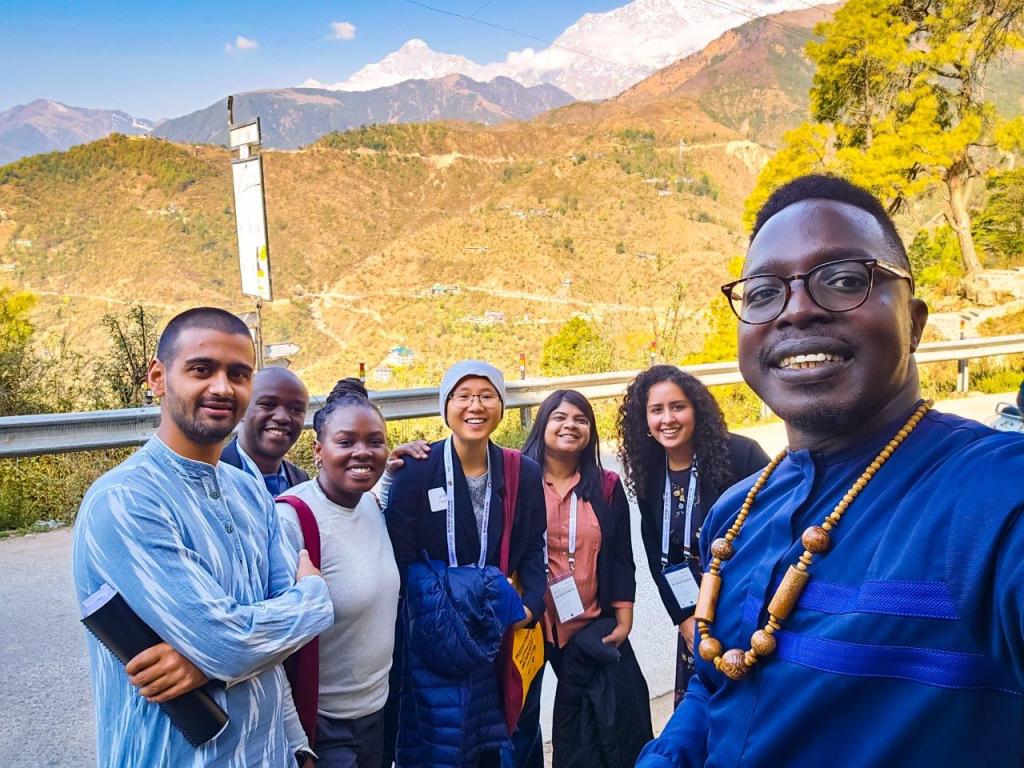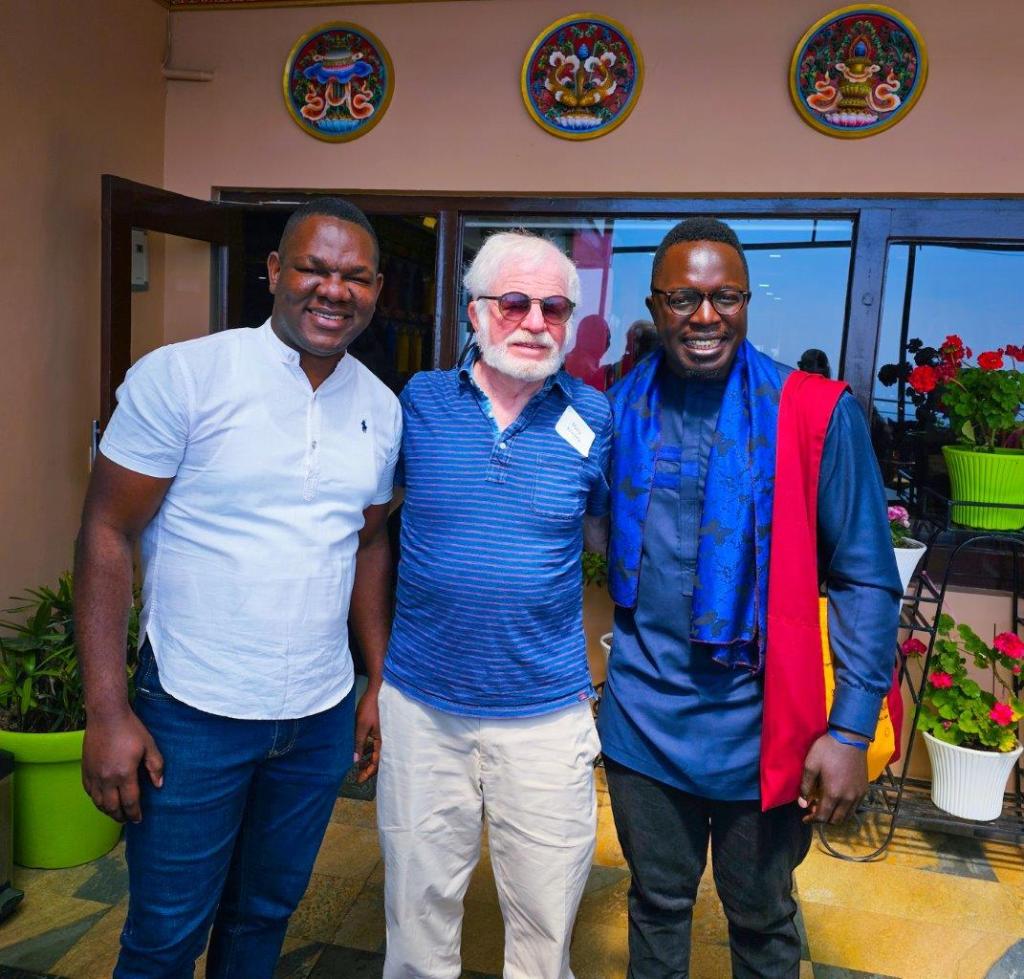During his recent visit to India and Dharamsala with his fellow Dalai Lama Fellows, Ogweno Stephen had the privilege of engaging with elders, monks, and Tibetans, culminating in a conversation with His Holiness the 14th Dalai Lama. From these interactions, several key messages emerged, spanning various aspects of life and society.

- Lessons from the Drum Circle: Ogweno learned that different tribes and communities can unite through the power of music. Even without sharing words, the beats of the drums have the remarkable ability to bring people together.
- Insights from the Humanqind School Project Visit: Visiting the Humanqind School project emphasized to Ogweno the intelligence and potential of children. By involving them, we can create inclusive and compassionate spaces and designs that consider everyone’s needs.
- Compassionate Capital vs. Human Capital vs. Financial Capital: Ogweno grasped the concept of compassionate capital, distinct from human and financial capital. Compassionate capital emphasizes empathy, kindness, and social impact, offering a more inclusive approach to wealth and value creation.
- Balancing Head, Hands, and Heart Work: Reflecting on a conversation at the airport, Ogweno realized the importance of balancing intellectual (head), physical (hands), and compassionate (heart) work. Achieving sustainability requires individuals and societies to prioritize all three types of work.
- Buddhist Philosophy on Acceptance and Contentment: Conversations with Tibetan monks underscored the importance of embracing life as it is, rather than constantly seeking what could be. Buddhist philosophy encourages recognizing and finding contentment in the present moment.
- Hambition – Humility, Happiness, and Ambition Combined: Ogweno learned a new coined term “hambition” that describes the blend of humility, happiness, and ambition. This mindset emphasizes finding fulfillment and purpose while striving for personal and societal growth.
- The Power of Trust without Expectations: Ogweno reflected on the idea of trusting others without attaching expectations or conditions. This approach fosters genuine connections and collaborations, leading to more meaningful relationships and outcomes.
- Serving the World Authentically: Ogweno learned the importance of serving the world as one’s authentic self, rather than conforming to others’ expectations. True impact comes from embracing one’s unique strengths and values.
- Scaling Inwards and Outwards: Scaling inward involves deepening emotional connections and intentions, while scaling outward expands impact and reach. Ogweno recognized the need for both types of scaling to create meaningful change.
- Embracing Strength, Happiness, and Ambition: Ogweno realized the significance of acknowledging and embracing strength, happiness, and ambition in oneself and others. By cultivating these qualities, individuals can lead more fulfilling and purpose-driven lives.
- Acceptance and Contentment: Reflecting on the Buddhist philosophy, Ogweno learned the importance of accepting life as it is without the need to defend or resist. By embracing the entirety of life, including its challenges and joys, one can find peace and contentment.
- Authentic Service: Ogweno internalized the lesson of serving the world authentically, emphasizing the importance of being true to oneself rather than conforming to external expectations. True impact stems from authenticity and genuine intent.
- Scaling Inwards and Outwards: Recognizing the need for both internal and external growth, Ogweno learned to scale inward by deepening emotional connections and intentions, while also scaling outward to expand impact and reach.
- Trust without Expectations: Reflecting on the power of trust, Ogweno contemplated the idea of trusting others without attaching expectations or conditions. Trusting unconditionally fosters genuine connections and collaborations.
- Living in Harmony with Nature: Ogweno absorbed the lesson of living in harmony with the law of nature, which does not discriminate. Just as nature affects everyone equally, unconditional love and acceptance should be extended to all, without discrimination.
- Seeing Reality Clearly: Ogweno realized the importance of seeing reality as it is, rather than through personal biases or desires. By refocusing on reality, individuals can make more informed decisions and foster positive reactions.
- Self-Care and Mindfulness: Ogweno internalized the concept of self-care and mindfulness, recognizing the importance of handling oneself carefully and nurturing one’s thoughts and body. Fragility resides within, necessitating careful attention to one’s well-being.
- Individual Responsibility for Happiness and Suffering: Reflecting on Buddhist teachings, Ogweno understood that one’s happiness and suffering lie within their own hands. By focusing on self-liberation and personal growth, individuals can find lasting happiness and peace within themselves.
- Dialogue of Love: Ogweno learned that dialogue can be an expression of love, fostering understanding and connection between individuals.
- Education and Human Flourishing: Education extends beyond literacy; it encompasses the holistic development of individuals, contributing to human flourishing and well-being.

Overall, Ogweno’s experiences in India and Dharamsala provided profound insights into compassion, acceptance, and personal growth, shaping his perspective on leadership and societal change.
